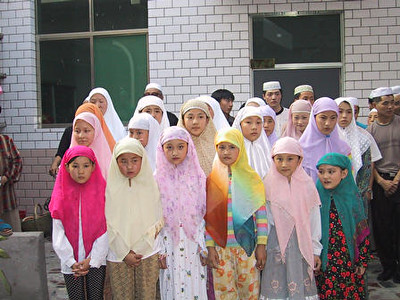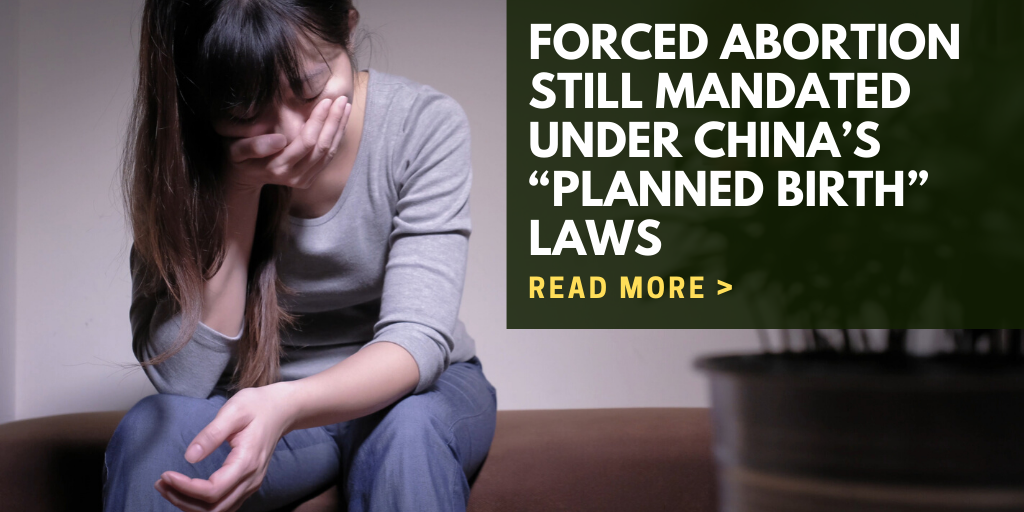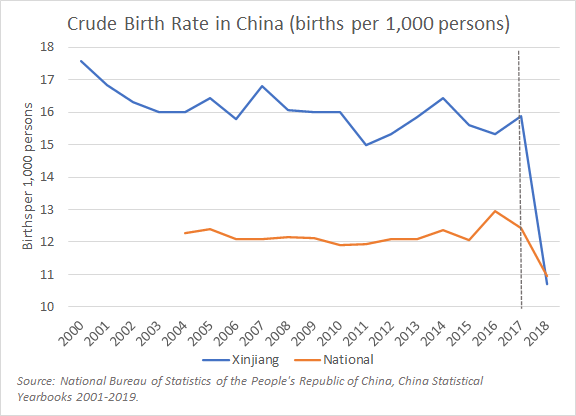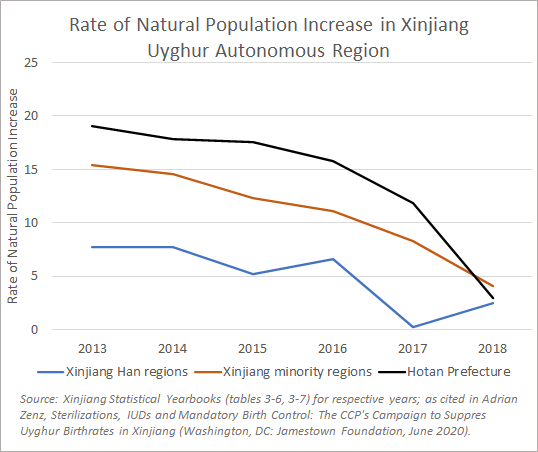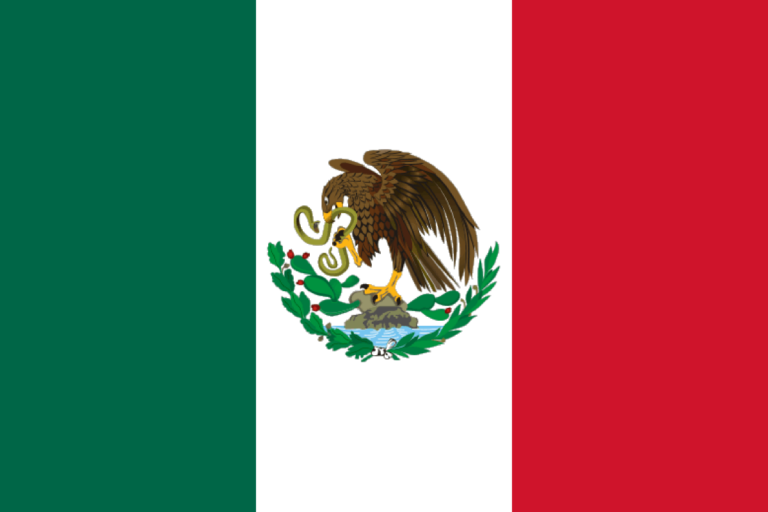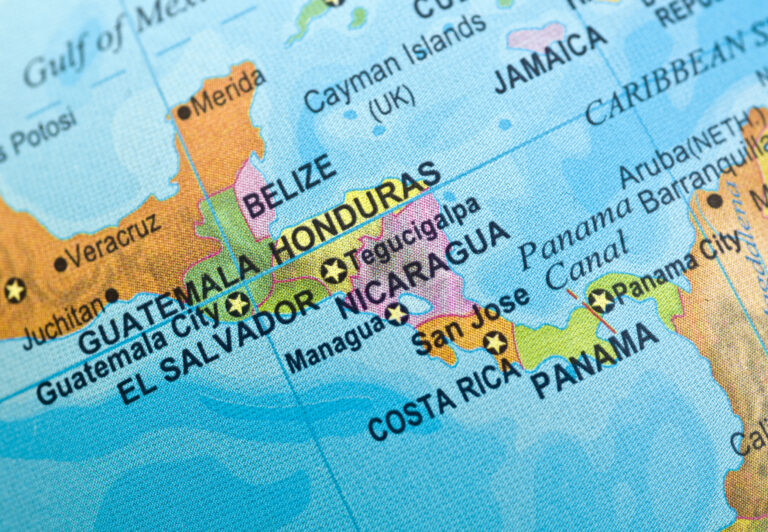The Chinese Communist Party (CCP) has been carrying out a brutal population control campaign to reduce the population of Uyghurs, Kazaks, and other ethnic Muslim minorities in China’s far-west Xinjiang Uyghur Autonomous Region (XUAR), reports released last week have revealed.
On June 29th, two reports investigating the CCP’s population control efforts in Xinjiang were released simultaneously, one from the Associated Press (AP) and the other by the Jamestown Foundation. The latter report was authored by German researcher Adrian Zenz, a non-resident Senior Fellow in China Studies at the Victims of Communism Memorial Foundation in Washington, D.C. Zenz is among the world’s foremost scholars on human rights abuses perpetrated by the Chinese government in Tibet and Xinjiang.
According to the dual reports, thousands of Uyghur and Kazak women have been forcibly sterilized, forcibly fitted with IUDs, or forced to undergo abortion if they are discovered by police to be pregnant with an ‘illegal’ out-of-quota child. The accounts closely echo the egregious human rights abuses inflicted by the CCP under the now-ended one-child policy.
Investigative reporting from the AP reveals that police and government officials have conducted door-to-door home inspections without warning in ethnic minority communities in search of ‘illegal’ children and pregnancies.
Women who are found having three or more children are hit with crushing fines equivalent to 3 to 8 times their annual household income. Those who are unable to pay the exorbitant fines are arrested and sent off to internment camps.
Women found to be pregnant with an out-of-quota child are being forced to submit to abortion, reports have found. One Kazak woman interviewed by the AP was told by officials to abort her unborn child and threatened that her brother would be detained if she refused.
Another woman interviewed by the AP, a former detainee at an internment camp, revealed that one of the instructors at the internment camp where she was detained had warned inmates that they would be required to have an abortion if they are found to be pregnant. According to her account, one of her fellow inmates disappeared from the camp and was never seen again after she was found to be pregnant while in the camp. Several other women in the camp underwent abortions after discovering they were pregnant for fear of the consequences.
Many Uyghur and Kazak women in the region are being routinely monitored and tested for illegal pregnancies. Many ethnic minorities have been forced to attend weekly flag-raising ceremonies, the AP discovered. In some villages, following these flag-raising ceremonies, women were forced to register all their children with government records or were forced to undergo gynecological exams to see if they were pregnant.
Women are also being forcibly fitted with IUDs en masse. Others are being forced to submit to sterilization or receive long-acting contraceptive injections. According to government documents uncovered by Adrian Zenz, the Xinjiang government in 2019 planned to impose “birth control measures with long-term effectiveness” on more than 80% of all women of reproductive age in four rural ethnic minority prefectures in southern Xinjiang.
According to Zenz’s report, a sampling of birth control statistics from 12 villages and urban districts in Kuqa County (a small rural predominantly Uyghur county in central Xinjiang) revealed that nearly 3 out of every 4 women of reproductive age were fitted with IUDs.
The CCP’s efforts to significantly ramp up mandatory IUD insertion or long-acting contraception on ethnic minorities in Xinjiang continues to be enforced with brutal consistency in spite of the fact that birth control and abortion are strongly opposed by the Uyghurs and Kazaks who are predominantly Muslim.
To support its invasive surveillance of pregnancies, the CCP has been collecting detailed records on individual citizens, in order to identify and track persons suspected of violating the government’s planned birth policy.
A 2019 Communist Party directive issued in Gumudi, a town to the northeast of Xinjiang’s largest city, Ürümqi, instructed party leaders to carry out “net-type demographic work” with “no blind spots” on the people living in the jurisdiction in a massive effort to record each household’s size and degree of compliance with the planned birth policy. The directive called on party leaders to “Severely investigate and deal with the illegal pregnancy and illegal birth issues.”
In Qapqal County, a rural, far-western administrative division bordering Kazakhstan, 629 policy violators were identified in the government’s search for ‘illegal’ children, according to Zenz’s research. Government reports claimed that they were “resolutely winning the assault on the battlefield of illegal births.”
The Chinese government’s crackdown on births in predominantly ethnic minority villages and counties has severely depressed birth rates in these areas, demographic data reveals, demonstrating that reports of forced abortions and forced IUD insertion are not isolated events and are more broadly enforced than previously realized.
Birth rates in predominantly Uyghur and Kazak counties in Xinjiang had long consistently been among the highest in all of China. In 2010, according to Zenz’s research, nine out of the ten counties in China that had the highest rate of natural population increase (calculated as births minus deaths) were counties located in Xinjiang that were predominantly inhabited by Uyghur and Kazak minorities.
However, according to the Population Research Institute’s assessment of official population statistics from the Chinese government, the birth rate in Xinjiang dropped precipitously in 2017, the same year in which the Xinjiang planned birth ordinances were substantially revised to officially allow Han couples to have the same number of children as ethnic minorities and the same year the government began detaining Uyghurs and other ethnic minorities in internment camps. While Xinjiang had long had higher birth rates than the national average, in 2018, the birthrate in Xinjiang suddenly and sharply declined by 33%. In fact, according to official Chinese government statistics, the birth rate in Xinjiang in 2018 had fallen below the national average.
Province-level population data fails to distinguish between the birth rates of Han Chinese and those of ethnic minorities in the region, though, masking complexities in the data. For instance, according to Zenz’s report, the Han population in Xinjiang has also decreased by about 750,000 between 2015 and 2018 due to low birth rates and outmigration of Han Chinese looking to leave Xinjiang. Official Chinese government population statistics also show that the national average birth rate in China overall has declined markedly since 2017, after a brief rise in the birth rate following the roll out of the two-child policy in 2016.
A deeper look with data collected by Zenz from Xinjiang Statistical Yearbooks shows that the tightening of planned birth policies in Xinjiang has in fact had a significant effect on the rate of natural population increase in predominantly ethnic minority areas.
The rate of natural population increase in Xinjiang’s ethnic minority regions have sharply declined by 67% since 2015 when the government began tying the high birth rate among Muslim ethnic minorities to “religious extremism,” according to Zenz. In Hotan Prefecture (a vast administrative division in southern Xinjiang predominantly inhabited by ethnic minorities) the rate of natural increase declined even more sharply, declining by 71% since 2015. Declines in the rate of natural population increase in ethnic minority areas declined more steeply after internment camps were in full swing in 2017.
Following the release of the reports from Adrian Zenz and the AP, the U.S. State Department condemned the Chinese government’s practice of forced abortions and forced sterilizations and called the findings of the reports “disturbing.”
“German researcher Adrian Zenz’s shocking revelations are sadly consistent with decades of CCP practices that demonstrate an utter disregard for the sanctity of human life and basic human dignity,” Secretary of State Mike Pompeo said in a press release from the State Department on June 29th. “We call on the Chinese Communist Party to immediately end these horrific practices and ask all nations to join the United States in demanding an end to these dehumanizing abuses.”
Human rights experts have said that the CCP’s efforts to reduce the population of Uyghurs, Kazaks and other ethnic minorities in Xinjiang could amount to genocide under the U.N. Convention on the Prevention and Punishment of the Crime of Genocide. Article II of the Convention defines genocide which includes acts attempting to destroy in whole or in part any ethnic, national, racial, or religious group by “Imposing measures intended to prevent births.”
“We urge the State Department to investigate whether the Chinese authorities’ deliberate and systematic attempt to genetically reducing the Turkic Muslim population in Xinjiang meets the legal definition for genocide as contemplated in the Genocide Convention,” said Nury Turkel, a Uyghur, lawyer, and commissioner for the United States Commission on International Religious Freedom, in a press release.
Reports of tightening birth restrictions on ethnic minorities in Xinjiang come as the CCP is simultaneously offering incentives in other parts of the country for families to have more children to help stem the country’s chronically low birth rate.
Unlike most parts of China which are largely ethnically homogenous and inhabited predominantly by ethnic Han Chinese, in Xinjiang, ethnic minorities such as the Uyghurs and Kazaks make up the majority, with less than one-third of the population being Han Chinese.
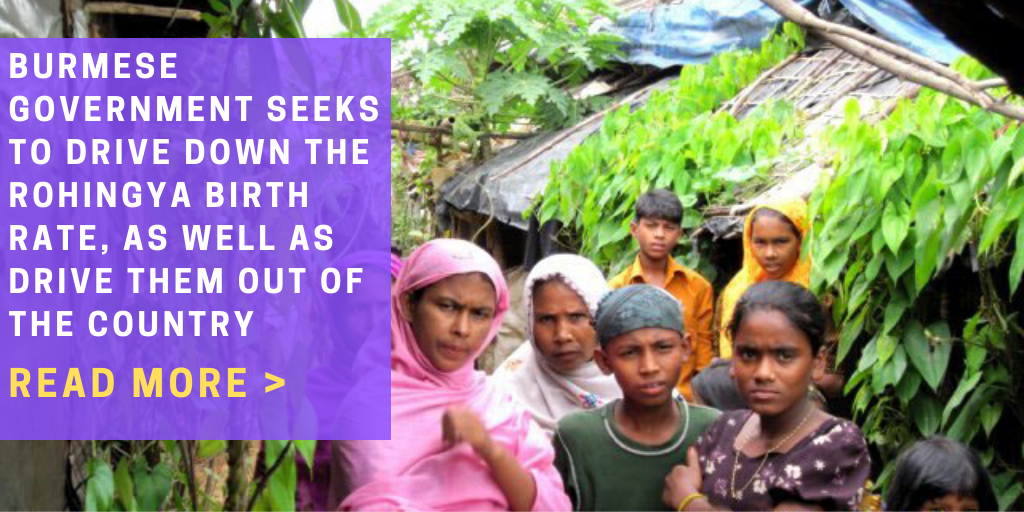
Beginning in late 2016, the CCP set up a number of heavily-guarded internment camps which Beijing has referred to intermittently as “re-education centers” or as “vocational training centers” that the government claims provide job skills training.
Initially, the CCP denied the existence of these camps but in 2019, Beijing changed its story, claiming that the camps were “boarding schools” providing vocational skills training and lessons in Mandarin and domestic law. The Party claims the camps are necessary to combat poverty and religious extremism in the region.
The CCP’s crackdown on Muslim minorities has been condemned globally as excessively broad for targeting large segments of the population with no radical tendencies for exercising basic universally recognized civil liberties. Hundreds of thousands have been sent to the camps or flagged for monitoring for simply practicing their faith or showing outward signs of their cultural traditions such as growing out beards, wearing a headscarf, traveling to another country, or possessing a copy of the Quran in their homes.
Experts estimate that more than 1 million Uyghur and other Muslim minorities have been forcibly detained in internment camps since 2016.
The new reports reveal that having too many children is a common reason for persons to be sent to the internment camps.
Inside the camps, women are being forced to attend lectures which berate them for having too many children, according to investigative reporting from the AP. There are additionally reports that some women are being forced by internment camp guards to confess their ‘crime’ of having more children than the local planned birth ordinances allow. One woman interviewed by the AP recounted the words she had heard one of her fellow inmates recite to camp guards in an extracted ‘confession’:
“I gave birth to too many children,” her fellow inmate confessed according to an interview obtained by the AP, “It shows I’m uneducated and know little about the law.”
Accounts that surfaced last year from women formerly detained at the camps had revealed that female detainees were being forced to take pills or to have injections without explanation of what they were receiving. Afterwards, women noticed that their periods had stopped.
“They injected us from time to time,” a 54-year-old woman who had been detained for over a year in an internment camp revealed last year in an interview with France24, “We had to stick our arms out through a small opening in the door. We soon realised that after our injections that we didn’t get our periods any more.”
In an interview obtained by Radio Free Asia (RFA) last year with Tursunay Ziyawudun, a Uyghur woman and internment camp survivor, it was revealed that women inside the camps are frequently forced to take unknown medicines or are forcibly taken away to hospitals to perform operations on them that make them unable to have children. According to Ziyawudun, many women were forcibly taken off to hospitals in the middle of the night, and several of them died in the hospital, RFA reported.
Recent reports from the AP released last week make clear that the testimonies from former detainees revealed last year were not isolated incidents but are instead part of a widespread pattern within the camps.
Seven of the women interviewed by the AP recounted similar stories of being forcibly administered contraceptives or forcibly fitted with IUDs. One woman interviewed by the AP said that she was repeatedly kicked in the abdomen during interrogations by camp guards after being injected with an unknown substance. She now claims that she is unable to have children and continues to suffer from bleeding due to the injuries she endured.
IUDs are also forcibly fitted on women in internment camps. According to one former detainee, unmarried and married women were separated into two groups with mandatory pregnancy tests for the married women and IUDs for married women who had at least one child.
Under the one-child policy, Han Chinese couples in Xinjiang were limited to one child in urban areas and allowed up to two children in rural areas. Ethnic minorities like the Uyghurs and Kazaks, however, were—at least on paper—permitted to have two children if they were living in urban areas and allowed up to three children in rural areas. Uyghur and Kazak families could often evade the policy’s restrictions as well by paying fines or bribes or by registering their child under another household.
But in 2017, the planned birth ordinances in Xinjiang were changed to allow Han Chinese to have the same number of children as ethnic minorities. Fines for violating the policy were also increased. And while the new policy on paper may appear to apply the policy restrictions equally, in reality, predominantly Muslim ethnic groups like the Uyghurs and Kazaks are heavily targeted by the policy’s restrictions.
While Han couples are also subject to fines, only ethnic minorities are sent off to the internment camps for “re-education” if they have too many children or fail to pay fines. Ethnic minorities are also much more closely watched than their Han peers. They are subject to in-home invasions and inspections by police without notice and they are more harshly punished.
On the contrary, the Chinese government offers a wide range of tantalizing incentives to Han Chinese living in other parts of the country in an attempt to encourage them to move to Xinjiang. The Xinjiang Construction and Production Corps (XPCC), a paramilitary organization controlled by Beijing that has long settled Han Chinese in Xinjiang, has offered a number of incentives to young Han couples including free land, well-paying teaching or police jobs, monthly stipends, medical benefits, and apartments with up to 4 years of free rent.
Meanwhile, thousands of ethnic Uyghurs and Kazak have been relocated to other part so the country by the government to work jobs that pay little to nothing under government claims that such relocations help improve the economic status of minorities.
Han Chinese academics in Xinjiang in recent years have blamed the high birth rate among the Uyghurs and Kazaks for fostering religious extremism and poverty. According to Zenz’s research, government and academic papers have referred to the birth rate of ethnic minorities in the region as “excessive” and have claimed that the population growth and concentration of ethnic minorities in Xinjiang “weakens national identity and identification with the Chinese Nation-Race (Zhonghua Minzu).”
Is the CCP’s policy ultimately driven by a “master race” ideology? It would seem so.


